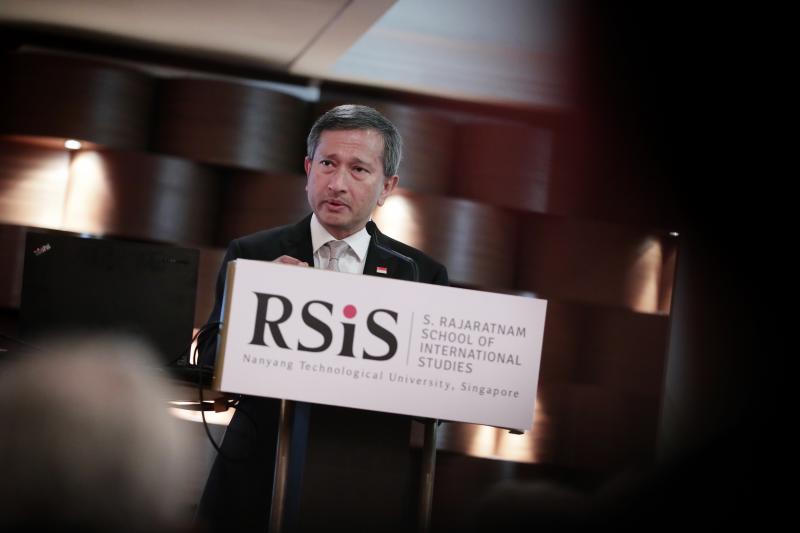How Singapore is battling three key security challenges: Vivian Balakrishnan
Sign up now: Get ST's newsletters delivered to your inbox

Foreign Affairs Minister Vivian Balakrishnan speaking at the 13th Asia-Pacific Programme for Senior National Security Officers on April 8, 2019.
ST PHOTO: KELVIN CHNG
SINGAPORE - With technological disruption, today's world is confronted with three security challenges: polarisation, radicalisation and cyber threats.
And Singapore, being a small and open economy, and a country that is multi-racial and multi-religious, is seeking to deal with these challenges based on three key principles, said Foreign Affairs Minister Vivian Balakrishnan on Monday (April 8).
The first is to address the social disruption brought about by technological advancements; second, to promote interfaith dialogue and enact laws to fight fake news; and third, to take a multi-faceted approach to tackle cyber threats.
Speaking at a regional conference on national security, Dr Balakrishnan noted that the new technological revolution is resulting in an explosion of big data as well as breakthroughs in automation and robotics, among other consequences.
"This, in turn, is leading to another cycle of social and political disruption, and it will have profound implications for national and global security," he told more than 80 national security practitioners, policymakers and academics at the 13th Asia-Pacific Programme for Senior National Security Officers (APPSNO).
The annual conference, whose theme is "National Security in the Age of Disruption" this year, is organised by the Centre of Excellence for National Security of the S. Rajaratnam School of International Studies, with the support of the National Security Coordination Secretariat in the Prime Minister's Office.
In his 30-minute opening speech, Dr Balakrishnan drew a parallel between the Industrial Revolution and the current "digital gilded age" - both of which created winners and losers.
Today, the digital winners are supra-national tech companies, such as Google and Facebook. which are growing exponentially in economic and political influence. The losers are those who have not been able to acquire new skills and are losing their jobs, and others who are feeling wage stagnation, he noted.
This has created a feeling that the fruits of globalisation and technological advancements have not been evenly distributed, leading to a widening rift between the political views of the left and right.
Digital media has also created ideological echo chambers in which people can affirm their views - no matter how mistaken or biased they are - and this leads to a more fractious and divided society, he noted.
To deal with such polarisation, Dr Balakrishnan said Singapore seeks to give citizens the confidence that society will stand collectively together with them, and this is done by investing in Singaporeans.
Schools are encouraged to tap technology to cultivate a generation of "digital natives" who can quickly adapt to labour market shifts. Schemes like SkillsFuture also enable Singaporeans to upgrade their skills and master new technologies regardless of their age, he added.
Investments are made in the social security system, to not only ensure the most vulnerable in society are protected, but to enable people to bounce back and keep up with the challenges of the future, Dr Balakrishnan said.
"If we succeed in building confidence domestically, then that gives us the ability to counter the spread of radical ideas, hateful ideologies and instead, to focus on promoting social unity and to stem the danger of increased polarisation that we are witnessing all over the world."
On radicalisation, Dr Balakrishnan highlighted that cyberspace has become the frontline where terrorists and political opportunists spread propaganda, recruit followers and coordinate attacks.
Even the less obviously dangerous falsehoods can have severe consequences for the social fabric over time, he pointed out.
In Singapore, there is evidence of fake online activity on issues affecting public interest, he said. He gave several examples, including the use of inauthentic online accounts to spread a falsehood that Singapore was helping to launder 1MDB (1Malaysia Development Berhad) money in return for favourable agreements with Malaysia.
Said Dr Balakrishnan: "Singapore believes in doubling down on our efforts to promote interfaith dialogue and to enact laws, and to educate our public on fake news and online manipulation,"
Later this year (2019), Singapore will host its first international conference on social cohesion and interfaith harmony. This follows from the Faithfully Asean event in December (2018) - an inaugural exchange programme attended by 40 interfaith practitioners and activists, he said.
To allow the Government to act decisively against online falsehoods which are created and propagated by malicious actors, a draft law was also introduced in Parliament last Monday (April 1), he noted. "If this Bill is passed, Singapore will become one of the first few countries in the world to legislate against this increasingly clear and present danger."
While legislation is critical, the most crucial line of defence against online falsehoods is having well-informed and discerning citizens, Dr Balakrishnan said.
To this end, the Government is expanding the school curriculum and has launched campaigns to encourage good cyber habits among Singaporeans. It will also work with businesses and community groups to raise awareness on digital information and the media literacy, he added.
Thirdly, Singapore will continue to take a multi-prong and multi-sectoral approach in tackling cyber threats, given its complex and trans-boundary nature.
At the domestic level, this means fostering close collaboration between Government, businesses, community organisations and individuals. At the international level, countries must come together to forge a unified method to address cyber threats and to set the norms that govern cyberspace, he said.
At the regional level, for example, the Asean-Singapore Cybersecurity Centre of Excellence, to be launched in October (2019), will conduct research and training in such areas as cyber norms and cyber policy issues, and facilitate the exchange of information and best practises, he added.


